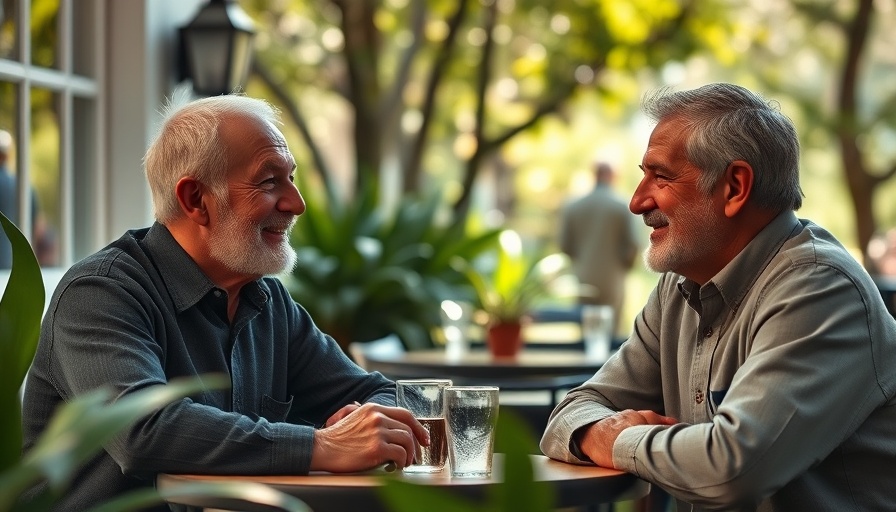
Connecting Across Generations: The Importance of Socialization in Aging Men
Loneliness can be a silent killer, especially among aging men, who often face increased social isolation. As highlighted in a recent NPR article, programs designed to foster social connections, such as the cleverly named ROMEO (retired older men eating out), highlight an innovative approach to counter this trend. In Harpswell, Maine, such initiatives aim to invite older men into a relaxed setting, encouraging them to bond over meals rather than assigning them the stigma often associated with support groups.
The Hidden Crisis of Male Loneliness
The reality is stark: men over the age of 75 show alarmingly high suicide rates in the U.S. This sobering statistic points to deeper issues regarding mental health and social support. According to mental health professionals like Mary Gagnon from NAMI Maine, feelings of being a 'burden' and experiencing loss can exacerbate loneliness for many older men. The lack of social connection is often a perilous path toward deteriorating mental health.
The Power of Connection
Mary Gagnon emphasizes, "The enemy of suicide is connection." This insight underscores how crucial social interactions are in promoting mental wellness and reducing the risks associated with isolation. Programs like ROMEO serve as a much-needed antidote, fostering camaraderie through communal meals while avoiding the stigma of being labeled as needy.
Innovative Community Initiatives: Fighting Isolation
The drive to create environments conducive to socialization has led to creative solutions. Community kitchens and volunteer-run meal deliveries initiated across the country aim to pull older men from behind their closed doors and bring them into community life. For example, Surrey Hardcastle's efforts in Harpswell provide much-needed nutrition and, more importantly, opportunities for interaction, showing how such initiatives can change lives.
Why Eating Together Matters
Shared meals are a powerful tool for connection. They not only provide sustenance but also create an environment where stories can be shared, friendships formed, and health increased. As seen in the recent gatherings, where about 55 men came together for lunch, these casual meet-ups can spark new friendships and support systems without the associated vulnerability of traditional groups.
Addressing Barriers to Participation
It is important to recognize the barriers that prevent older men from engaging in social activities. Many traditional support avenues may not resonate with them, leading to the necessity of reformulating social outreach. As Tom Mahoney indicated, it was essential to frame the meal gatherings as informal rather than supportive gatherings to get the desired turnout.
Future Directions: Integrating Wellness into Community Programs
As the conversation around men’s health progresses, these innovative programs might evolve into larger initiatives focusing on both physical and mental well-being. The concept of group meals could be expanded into broader communal activities encompassing fitness or wellness workshops, adapting to the needs of older men. Current trends indicate a growing recognition of holistic approaches to well-being, suggesting that we must keep innovating in ways to connect this demographic.
Empowering Older Men: The Ongoing Journey
While programs like ROMEO are promising, they represent just the tipping point in what should be an ongoing effort to empower older men. It is vital for communities to not only create spaces for socialization but also to ensure that there are ongoing conversations about the mental health needs of older populations. As societal stigma regarding mental health decreases, it will be essential to foster open discussions about feelings, needs, and the resources available.
In conclusion, bridging the gap for older men in terms of social connection could mean addressing the broader questions related to their well-being. By creating enriching environments filled with opportunities for friendship and support, we can—quite literally—save lives.
 Add Row
Add Row  Add
Add 




 Add Row
Add Row  Add
Add 

Write A Comment